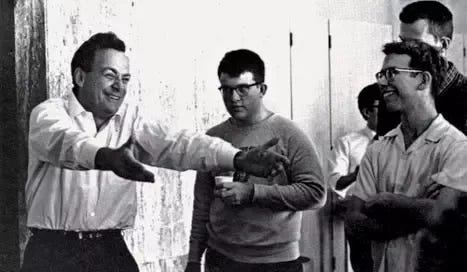Feynman: On Definitional Neurosis
Click here for a one-page printer-friendly version of this article, and click here for an audio version.

Feynman: On Definitional Neurosis
I came across the following (unsourced) quotation from Richard Feynman on the internet:
We cannot define ANYTHING precisely. If we attempt to, we get into that paralysis of thought that comes to philosophers, who sit opposite each other, one saying to the other, “You don't know what you are talking about!” The second one says, “What do you mean by KNOW? What do you mean by TALKING? What do you mean by YOU?"
As a student of Torah, I was “born and bred” in the tradition of Brisk. The derech ha’limud (learning methodology) of my yeshiva is the Brisker Derech, pioneered by Rav Chaim Soloveitchik and developed by his offspring, most notably Rav Yosef Dov ha’Levi Soloveitchik. This methodology focuses heavily on sevara (conceptual definition). My rebbi wrote a profound essay, entitled On Scientific and Halachic Thought, in which he compares the Brisker Derech to the methodology of science. Although there are key differences, the common denominator is the quest for precise, elegant, conceptual definitions.
Few people in the last century understood and appreciated science like Richard Feynman, the Nobel Prize winning theoretical physicist and innovator who also happened to be a highly gifted teacher and lover of knowledge. What, then, are we to make of his statement cited above, in which he appears to denigrate the search for definitions? Surely he can’t actually mean that “we cannot define ANYTHING precisely”!
Karen Horney, in Self-Analysis, identifies two distinguishing features of neuroses:
The outstanding characteristic of neurotic trends is their compulsive nature, a quality that shows itself in two main ways. First, their objectives are pursued indiscriminately … [The second] is the reaction of anxiety that ensues from their frustration.
What Feynman calls “that paralysis of thought that comes to philosophers” I call “definitional neurosis.” The hallmarks of definitional neurosis are (1) the indiscriminate demand for precise definitions, and (2) the reaction of anxiety in their absence. It is true that conceptual definitions are the golden standard of knowledge. However, the nuanced thinker who “says to wisdom, ‘you are my sister,’ and calls understanding a good friend” (cf. Mishlei 7:4) will recognize that the insistence on precise definition can often be an impediment to understanding. This is what Feynman means by “paralysis of thought.”
Ironically, it is often the most highly intelligent people who fall prey to definitional neurosis, obstinately refusing to proceed until every term is precisely defined. Such individuals may fancy themselves the (superior) Socrates and their partners in conversation the (inferior) Athenian youths. In truth, Socrates was sensitive to the minds of his students and used questions to move the discussion forward. In contrast, the definitional neurotics fail to notice when their insistence on definition obstructs the pursuit of knowledge. Worse yet is when pseudo-Socratic tactics are used as a psychological defense mechanism – as a means of stifling or evading a particular line of inquiry.
There is a time to define and a time to refrain from defining. How does one know when to press for definitions and when to follow the flow of the inquiry or discussion? What are the precise criteria for making such a determination? The precise answer to that question is …
___________________________________________________________________________________
If you've gained from what you've learned here, please consider contributing to my Patreon at www.patreon.com/rabbischneeweiss. Alternatively, if you would like to make a direct contribution to the "Rabbi Schneeweiss Torah Content Fund," my Venmo is @Matt-Schneeweiss, and my Zelle/Chase QuickPay and PayPal are mattschneeweiss at gmail.com. Even a small contribution goes a long way to covering the costs of my podcasts, and will provide me with the financial freedom to produce even more Torah content for you.
If you would like to sponsor an article, shiur, or podcast episode, or if you are interested in enlisting my services as a teacher or tutor, you can reach me at rabbischneeweiss at gmail.com. Thank you to my listeners for listening, thank you to my readers for reading, and thank you to my supporters for supporting my efforts to make Torah ideas available and accessible to everyone.
Be sure to check out my YouTube channel and my podcasts: "The Mishlei Podcast", "The Stoic Jew" Podcast, "Rambam Bekius" Podcast, "Machshavah Lab" Podcast, "The Tefilah Podcast" For the full guide to all of my Torah content, click here.



